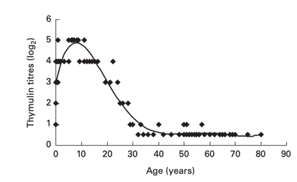Dr. Gary Huber
Why is your thymus gland so critical to health and longevity? Answering that requires us to understand a little about what the thymus gland does. Your thymus gland exists in the middle of your chest just above the heart, right in between your lungs. It serves 2 primary functions: train your white blood cells and produce hormones to regulate your immune system. The thymus is a training ground for your white blood cells to become Navy Seal killer cells. Your white blood cells (WBC), specifically the lymphocytes, serve to fight off infection and even cancer. Immature lymphocytes (WBC) are produced in your bone marrow but then travel to the thymus where they become mature and are given orders to become “killer T cells”. Obviously this is critical for survival against a world of invading microorganisms.
Mother nature has made provisions that we live long enough to procreate and continue the species but after age 30 or so, your body is not strongly wired for survival. In fact, if you go back to the 1500’s the average life expectancy was only around 45. Infections knocked us off as our thymus gland shrunk and we lost the protection of our immune system. A famous study by Consolini in 2000, shows that by the time we are 36 our thymus function has flatlined and stays that way the rest of our life. This opens the door for infections and cancer to move in as our defenses are down.

Fear not. We now have thymic peptides that can and do restore this function. The thymus produces hormones that speak to your brain and help to regulate the immune system. These simple protein peptides can be taken as a subQ injection or as an oral capsule to stimulate those lymphocytes to be killer cells. But they go way beyond this simple function and offer a braod impact on our overall health as we age.
In one rodent study, rats were treated with subQ injections of thymic peptides 5 times per week for 12 months and then observed next to a control group with no injections. The thymic peptide rate lived longer on average and had far less cancer. The thymic group experienced leukemias and lymphomas at a much lower rate by a factor of more than 3 times. Overall tumor incidence from all cancers were 50% less compared to controls. The conclusions by the authors is that this treatment slowed the rate of aging and decreased spontaneous tumor occurrence.
Recall that one of the clear hallmarks of aging, in fact how aging is defined, is a loss of immune function. This leads to rising inflammation throughout our body. But this is not a singular immune issue. The immune system is strongly tied to our central nervous system and our endocrine (hormone) system. Thymic peptides therefore impact all of the following:
- Aging & Longevity
- Alzheimers risk
- Diabetes risk
- Adrenal function and our stress response
- Heart attack and stroke risk
- Muscle and joint inflammation
- Gut health & Autoimmunity
- Obesity
- Thyroid disease
As we age our brain (pituitary) become less sensitive to the thymic signals. But old mice treated with thymic peptides from young mice showed a beneficial response. Mice studies exploring type 1 diabetes found that thymulin peptides could protect the insulin producing beta cells of the pancreas offer hope to stalling this disease if caught early on.
There are several thymic peptides of differing sizes and amino acid combinations. Subtle differences exist in how they work but collectively they strongly support immune function as they offer modulation of our native and adaptive immune system:
- Increased white cell count and T lymph function. Enhanced killer cell function.
- Speeds clearance of infection
- Slows or may even reverse autoimmune process
- Slows the rate of aging
- Physical and mental endurance
- Impacts mitochondria and senescent cell populations
- Promotes would healing and stem cell activation
- Angiogenesis – formation of new blood vessels
- Cancer - Improves immune response in cancer treatments
There are a host of thymic peptides to explore and it is easy to get lost in the similar sounding names and structures. Here are the 3 most commonly employed with good studies to support their function:
- Thymulin - subQ injection
- Thymogen Alpha-1 – oral capsule
- TB4-Frag – oral capsule
The use of these peptides is classically done in a pulsatile fashion. They are administered a few days per week or possibly daily in advancing doses for a short period of time and then halted. They are then restarted again later or alternated with other peptides. Your physician should work with you to decide best use for the given issue you are facing. The use of thymic peptides marries well with BPC-157 and Epitalon as an excellent combined strategy for longevity.
